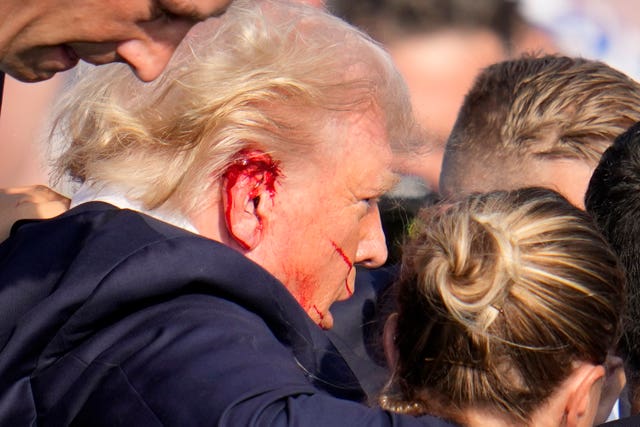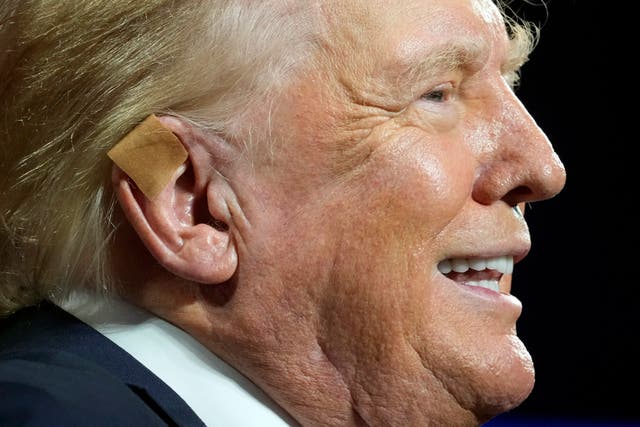Trump struck by bullet during assassination attempt, FBI says
Law enforcement issued a statement after two weeks of speculation and conflicting reports.

The FBI has confirmed a bullet struck Donald Trump’s ear, clearing up conflicting accounts about what caused the former president’s injuries after a gunman opened fire at a Pennsylvania rally.
“What struck former President Trump in the ear was a bullet, whether whole or fragmented into smaller pieces, fired from the deceased subject’s rifle,” the agency said in a statement.
The statement marked the most definitive law enforcement account of Mr Trump’s injuries and followed ambiguous comments earlier in the week from director Christopher Wray that appeared to cast doubt on whether he had actually been hit by a bullet.

Up until now, federal law enforcement agents involved in the investigation, including the FBI and Secret Service, had repeatedly refused to provide information about what caused Mr Trump’s injuries.
The Republican presidential nominee’s campaign has also declined to release medical records from the hospital where he was first treated or to make the doctors there available for questions.
Updates have come either from Mr Trump himself or former White House doctor Ronny Jackson, a staunch ally who now represents Texas in Congress.
Though Dr Jackson has been treating Mr Trump since the night of the attack, he has come under considerable scrutiny and is not the former president’s primary care physician.
The FBI’s apparent reluctance to immediately vouch for Mr Trump’s version of events — along with the ire he and some supporters have directed at the bureau in the shooting’s aftermath — has also raised fresh tension between the Republican nominee and the nation’s premier federal law enforcement agency.
Questions about the extent and nature of Mr Trump’s wound began immediately after the attack, as his campaign and law enforcement officials declined to answer questions about his condition or the treatment he received after narrowly escaping death.
Those questions have persisted despite photos showing the trace of a projectile speeding past Mr Trump’s head, photographs that show teleprompter glass intact after the shooting, and the account Mr Trump himself gave in a Truth Social post within hours of the shooting, saying he had been “shot with a bullet that pierced the upper part of my right ear”.
“I knew immediately that something was wrong in that I heard a whizzing sound, shots, and immediately felt the bullet ripping through the skin,” he wrote.
Days later, in a speech accepting the nomination at the Republican National Convention in Milwaukee, Mr Trump described the horrific scene in detail while wearing a large, white, gauze bandage over his right ear.
“I heard a loud whizzing sound and felt something hit me really, really hard on my right ear. I said to myself, ‘Wow, what was that? It can only be a bullet,'” he said.
“If I had not moved my head at that very last instant,” Mr Trump said, “the assassin’s bullet would have perfectly hit its mark, and I would not be here tonight”.
But the first medical account of the former president’s condition did not come until a full week after the shooting when Dr Jackson released his first letter.
In that letter, he said the bullet that struck Mr Trump had “produced a 2 cm wide wound that extended down to the cartilaginous surface of the ear”. He also revealed that Mr Trump had received a CT scan at the hospital.
However, federal law enforcement involved in the investigation, including the FBI and Secret Service, declined to confirm that account, and Christoper Wray’s testimony offered apparently conflicting answers on the issue.
“There’s some question about whether or not it’s a bullet or shrapnel that hit his ear,” Mr Wray testified before he seemed to suggest it was indeed a bullet.
“I don’t know whether that bullet, in addition to causing the grazing, could have also landed somewhere else,” he said.

The FBI also said Thursday that its Shooting Reconstruction Team continues to examine bullet fragments and other evidence from the scene.
Dr Jackson, who has been treating the former president since the night of the July 13 shooting, told The Associated Press on Thursday that any suggestion Mr Trump’s ear was bloodied by anything other than a bullet was reckless.
“It was a bullet wound,” he said.
“You can’t make statements like that. It leads to all these conspiracy theories.”
In his letter on Friday, Dr Jackson insisted “there is absolutely no evidence” Mr Trump was struck by anything other than a bullet and said it was “wrong and inappropriate to suggest anything else”.
He wrote that at Butler Memorial Hospital, where the Republican nominee was rushed after the shooting, he was evaluated and treated for a “Gunshot Wound to the Right Ear”.
The FBI declined to comment on the Jackson letters.
Trump campaign spokesperson Steven Cheung blasted the media for asking if the campaign would release hospital records or allow the doctors who treated the Republican nominee there to speak,
“The media has no shame in engaging in disgusting conspiracy theories,” he said.
“The facts are the facts, and to question an abhorrent assassination attempt that ultimately cost a life and injured two others is beyond the pale.”
In emails last week, he told the AP that “medical readouts” had already been provided.
“It’s sad some people still don’t believe a shooting happened,” Mr Cheung said, “even after one person was killed and others were injured”.
Republican Senator Lindsey Graham also urged Mr Wray to correct his testimony in a letter, saying the fact Mr Trump had been hit by a bullet “was made clear in briefings my office received and should not be a point of contention”.
Mr Trump also lashed out at Mr Wray in a post on his Truth Social network, saying it was “No wonder the once storied FBI has lost the confidence of America!”
On Friday, he called Mr Wray’s comments “so damaging to the Great People that work in the FBI”.





